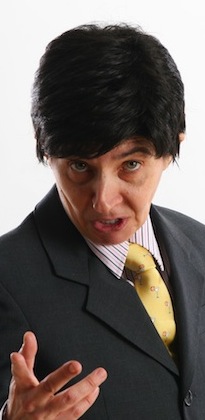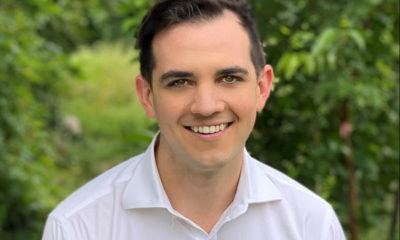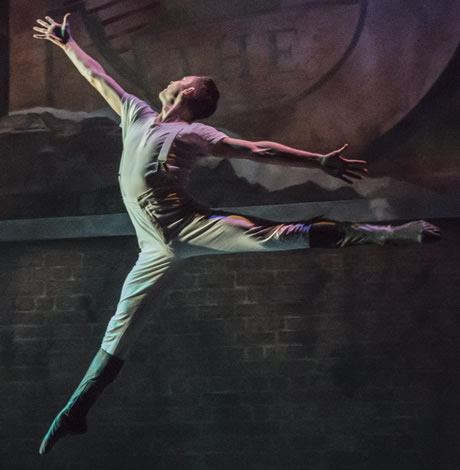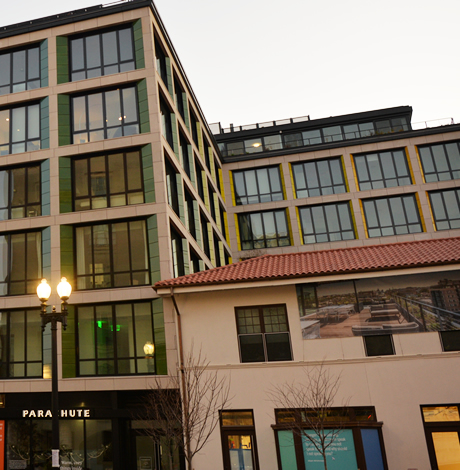Arts & Entertainment
Gay themes at Fringe
Edgy D.C. festival features several LGBT stories, players
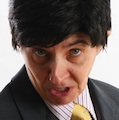
For this year’s Capital Fringe Festival, Laura Zam is stuffing a sock in her underpants.
Recently she explained: Along with a short wig and the suit and tie that she’ll wear to play the title motivational speaker in her one-woman show “An Hour with Ken Johnson” (at the Goethe Institut), she’s decided to complete the costume by adding a bulge down below.
“It’s fantastic to dress as a man,” says the seasoned performer. “I’ve played men in the past, but Ken is my most sustained male role. As a writer and an actor it’s allowed me to enter an entirely new world. The sock should only make it better.”
“What I’m doing combines comedy, theater and motivational talk,” continues Zam, a Brooklyn transplant who lives with her husband in D.C. “And Ken is part evangelical preacher and a little bit Anthony Robbins. He’s also a recovering Internet porn addict, and though he’s kind of weird and a bit of clown, he delivers a message of optimism and comments on human resilience. Hopefully audiences will have a laugh but also get something out of what he has to say.”
An annual performing arts event, the Capital Fringe Festival features more than 140 performances including theater, dance and music in various venues around town. It draws both accomplished and less experienced artists performing both well known and original, untested works. The results are uneven but rarely dull. Tickets are affordable.
Local African-American historian Anthony Cohen has twice retraced arduous Underground Railroad routes. After completing his second trek, walking from Alabama to Canada, Cohen uncovered an account describing how his runaway slave African-Jewish-Irish-Cherokee ancestor Patrick Sneed had traveled the identical path to freedom in 1849.
Blown away by his discovery, Cohen who is gay, began speaking about his connection to Sneed’s experience. For this year’s Fringe he’s adapted his lecture expressly for theater with a one-man show titled “Patrick & Me” (at Goethe Institut), supplementing the material with visuals and musical montages. “I went searching for the Underground Railroad,” says Cohen, “but the Underground Railroad was searching for me.”
At the Apothecary, Mixrun Productions presents Shakespeare’s “King Lear.” Only this time the tragic tale of betrayal and insanity is played out by present day bikers locked in a violent turf war. And while the company’s take on the classic is heavily abridged, says cast member Katie Wanschura who is gay, the text is otherwise mostly faithful. Because almost one third of the parts have been re-imagined as gay or bisexual, some pronouns have been changed.
A web designer by day, Wanschura is thrilled to be cast wily and wicked Edmund restyled as a flirtatious lesbian bartender at the aptly named Gloucester. “From behind the bar, I get to watch the story unfold,” she says. “Also I hit on the female patrons and interact with the audience. It’s great.”
For several years, Patrick Doneghy has toyed with the idea of doing a revue featuring men singing Broadway songs typically performed by women. With Dominion Stage’s “That’s What She Sang” at Studio’s Mead Theatre, he’s realized and expanded on the idea by writing, staging and acting in a juke box musical with a connected story.
Comprised of a seven man, mostly gay cast (Doneghy is gay), the show focuses on a queer men’s support group and the problems its members encounter. Songs include women’s tunes like “Gimme Gimme” from “Thoroughly Modern Millie,” and “Maybe This Time” from “Cabaret.”
“We’re exploring romantic mishaps here, not big social issues,” says Doneghy. “It’s a chance to hear music we all know in a new way and to hear some LGBT stories that don’t always get told.”
In “Cecily and Gwendolyn’s Capital Balloon Ride,” Philadelphia improv partners Kelly Jennings and Karen Gertz play a pair of time-traveling Victorian cultural anthropologists. Wherever they land — in this case Mountain at Mount Vernon Church– these curious, slightly loopy ladies take stock of their surroundings and set to work getting to know the locals.
“It’s unlike anything you’ve ever seen,” says Jennings, who is gay. “While our characters kick off the conversation, the audience actually guides the show exploring subjects that are important to them. Participation isn’t mandatory, but once warmed up, almost everyone is willing talk; and people leave feeling they’ve connected with their community in a way that doesn’t happen in any other theater experience.”
For performance schedules and venue locations, go to capfringe.org.
Books
Love or fear flying you’ll devour ‘Why Fly’
New book chronicles a lifetime obsession with aircraft

‘Why Fly’
By Caroline Paul
c. 2026, Bloomsbury
$27.99/256 pages
Tray table folded up.
Check. Your seat is in the upright position, the airflow above your head is just the way you like it, and you’re ready to go. The flight crew is making final preparations. The lights are off and the plane is backing up. All you need now is “Why Fly” by Caroline Paul, and buckle up.

When she was very young, Paul was “obsessed” with tales of adventure, devouring accounts written by men of their derring-do. The only female adventure-seeker she knew about then was Amelia Earhart; later, she learned of other adventuresome women, including aviatrix Bessie Coleman, and Paul was transfixed.
Time passed; Paul grew up to create a life of adventure all her own.
Then, the year her marriage started to fracture, she switched her obsession from general exploits to flight.
Specifically, Paul loves experimental aircraft, some of which, like her “trike,” can be made from a kit at home. Others, like Woodstock, her beloved yellow gyrocopter, are major purchases that operate under different FAA rules. All flying has rules, she says, even if it seems like it should be as freewheeling as the birds it mimics.
She loves the pre-flight checklist, which is pure anticipation as well as a series of safety measures; if only a relationship had the same ritual. Paul loves her hangar, as a place of comfort and for flight in all senses of the word. She enjoys thinking about historic tales of flying, going back before the Wright Brothers, and including a man who went aloft on a lawn chair via helium-filled weather balloons.
The mere idea that she can fly any time is like a gift to Paul.
She knows a lot of people are terrified of flying, but it’s near totally safe: generally, there’s a one in almost 14 million chance of perishing in a commercial airline disaster – although, to Paul’s embarrassment and her dismay, it’s possible that both the smallest planes and the grandest loves might crash.
If you’re a fan of flying, you know what to do here. If you fear it, pry your fingernails off the armrests, take a deep breath, and head to the shelves. “Why Fly” might help you change your mind.
It’s not just that author Caroline Paul enjoys being airborne, and she tells you. It’s not that she’s honest in her explanations of being in love and being aloft. It’s the meditative aura you’ll get as you’re reading this book that makes it so appealing, despite the sometimes technical information that may flummox you between the Zen-ness. It’s not overwhelming; it mixes well with the history Paul includes, biographies, the science, heartbreak, and exciting tales of adventure and risk, but it’s there. Readers and romantics who love the outdoors, can’t resist a good mountain, and crave activity won’t mind it, though, not at all.
If you own a plane – or want to – you’ll want this book, too. It’s a great waiting-at-the-airport tale, or a tuck-in-your-suitcase-for-later read. Find “Why Fly” and you’ll see that it’s an upright kind of book.
The Blade may receive commissions from qualifying purchases made via this post.
Theater
Out actor Kevin Cahoon on starring role in ‘Chez Joey’
Arena production adapted from Broadway classic ‘Pal Joey’

‘Chez Joey’
Through March 15
Arena Stage
1101 Sixth St., S.W.
Tickets start at $93
Arenastage.org
As Melvin Snyder in the new musical “Chez Joey,” out actor Kevin Cahoon plays a showbiz society columnist who goes by the name Mrs. Knickerbocker. He functions as a sort of liaison between café society and Chicago’s Black jazz scene circa 1940s. It’s a fun part replete with varied insights, music, and dance.
“Chez Joey” is adapted from the Broadway classic “Pal Joey” by Richard Rodgers and Lorenz Hart. It’s inspired by John O’Hara’s stories based on the exploits of a small-time nightclub singer published in The New Yorker.
A warm and humorous man, Cahoon loves his work. At just six, he began his career as a rodeo clown in Houston. He won the Star Search teen division at 13 singing songs like “Some People” from “Gypsy.” He studied theater at New York University and soon after graduating set to work playing sidekicks and comedic roles.
Over the years, Cahoon has played numerous queer parts in stage productions including “Hedwig and the Angry Inch,” “La Cage aux Folles,” “Rocky Horror” as well as Peanut in “Shucked,” and George the keyboardist in “The Wedding Singer,” “a sort of unicorn of its time,” says Cahoon.
Co-directed by Tony Goldwyn and the great Savion Glover, “Chez Joey” is a terrific and fun show filled with loads of talent. Its relevant new book is by Richard Lagravenese.
On a recent Monday off from work, Cahoon shared some thoughts on past and current happenings.
WASHINGTON BLADE: Is there a through line from Kevin, the six-year-old rodeo clown, to who we see now at Arena Stage?
KEVIN CAHOON: Anytime I want to land a joke in a theater piece it goes back to that rodeo clown. It doesn’t matter if it’s Arena’s intimate Kreeger Theatre or the big rodeo at the huge Houston Astrodome.
I was in the middle stadium and there was an announcer — a scene partner really. And we were doing a back and forth in hopes of getting laughs. At that young age I was trying to understand what it takes to get laughs. It’s all about timing. Every line.
BLADE: Originally, your part in “Chez Joey” Melvin was Melba who sings “Zip,” a clever woman reporter’s song. It was sort of a star feature, where they could just pop in a star in the run of “Pal Joey.”
CAHOON: That’s right. And in former versions it was played by Martha Plimpton and before her Elaine Stritch. For “Chez Joey,” we switched gender and storyline.
We attempted to do “Zip” up until two days before we had an audience at Arena. Unexpectedly they cut “Zip” and replaced it with a fun number called “I Like to Recognize the Tune,” a song more connected to the story.
BLADE: Wow. You must be a quick study.
CAHOON: Well, we’re working with a great band.
BLADE: You’ve played a lot of queer parts. Any thoughts on queer representation?
CAHOON: Oh yes, definitely. And I’ve been very lucky that I’ve had the chance to portray these characters and introduce them to the rest of the world. I feel honored.
After originating Edna, the hyena on Broadway in “The Lion King,” I left that to do “Hedwig and the Angry Inch” as standby for John Cameron Mitchell, doing one show a week for him.
Everyone thought I was crazy to leave the biggest musical of our time with a personal contract and getting paid more money that I’d ever made to get $400 a week at the downtown Jane Street Theatre in a dicey neighborhood.
At the time, I really felt like I was with cool kids. I guess I was. And I never regretted it.
BLADE: When you play new parts, do you create new backstories for the role?
CAHOON: Every single time! For Melvin, I suggested a line about chorus boys on Lakeshore Drive.
BLADE: What’s up next for Kevin Cahoon?
CAHOON: I’m about to do the New York Theatre Workshop Gala; I’ve been doing it for nine years in a row. It’s a huge job. I’ll also be producing the “Cats: The Jellicle Ball” opening on Broadway this spring; it’s a queer-centric uptown vogue ball with gay actor André de Shields reprising his role as “Old Deuteronomy.”
BLADE: There’s a huge amount of talent onstage in “Chez Joey.”
CAHOON: There is. I’m sharing a dressing room with Myles Frost who plays Joey. He won accolades for playing Michael Jackson on Broadway. We’ve become great friends. He’s a miracle to watch on stage. And Awa [Sal Secka], a D.C. local, is great. Every night the audience falls head over heels for her. When this show goes to New York, Awa will, no doubt, be a giant star.
BLADE: Do you think “Chez Joey” might be Broadway bound?
CAHOON: I have a good feeling it is. I’ve done shows out of town that have high hopes and pedigree, but don’t necessarily make it. “Chez Joey” is a small production, it’s funny, and audiences seem to love it.

The Capital Pride Alliance held the annual Pride Reveal event at The Schuyler at The Hamilton Hotel on Thursday, Feb. 26. The theme for this year’s Capital Pride was announced as: “Exist. Resist. Have the audacity!”
(Washington Blade photos by Michael Key)























-

 Federal Government4 days ago
Federal Government4 days agoTwo very different views of the State of the Union
-

 Virginia5 days ago
Virginia5 days agoVa. activists preparing campaign in support of repealing marriage amendment
-

 Opinions4 days ago
Opinions4 days agoThe global cost of Trump’s foreign aid ideology
-

 Movies3 days ago
Movies3 days agoMoving doc ‘Come See Me’ is more than Oscar worthy

